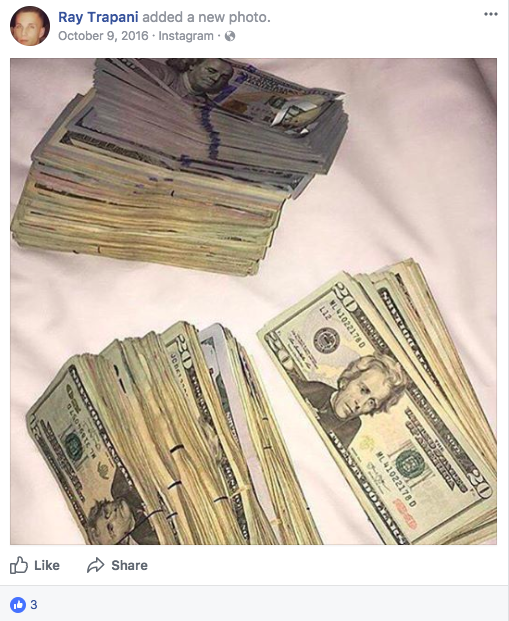- Two luxury-car-loving founders behind the crypto currency startup Centra have left the company just weeks after their company raised $32 million through an unregulated fundraising technique. The founders, Sam Sharma and Raymond Trapani, left Centra after a New York Times article brought to light the pair’s ongoing legal troubles. Members of the crypto-currency community have also shared concerns that Centra’s core product – a prepaid card for spending cryptocurrencies like bitcoin – may never be produced, though the company’s new lawyer says these fears are unfounded.
Two of the founders of a flashy crypto-currency startup that raised $32 million last month amid a storm of skepticism about its business and leadership have abruptly left the company.
Sam Sharma and Raymond Trapani – who reportedly had no previous experience running an crypto-currency business before founding Centra but whose love of luxury cars and piles of cash are well documented on both social media and in court documents – “are stepping aside,” the company announced on October 31 in a blog post.
Sharma most recently served as Centra’s president and Trapani as its chief operating officer, though both held various titles in the three-month whirlwind that marked the early days of the startup.
The cofounders made the decision to leave Centra on their own after an unflattering profile in The New York Times, said Allan Shutt, Centra's general counsel, adding that it's not unusual for founders to leave a company once it's outgrown them. The Times article highlighted the pair's relative inexperience in business and revealed that they have both been indicted on perjury charges in Manhattan.

"It wasn't a hard decision to say what is the best course here to push the company foward," he said.
Shutt claimed to speak on behalf of Sharma and Trapani. The pair didn't respond to attempts to reach them via Facebook and LinkedIn. Email sent to Trapani's work address was rejected by Centra's server.
Centra has said it's developing a debit card that users will be able to link to the digital wallets they use to store cybercurrencies including bitcoin and ether. Users would be able to use the debit card to make purchases with their cybercurrencies of items being sold for dollars or other traditional currencies.
After announcing its product in August, the company brought on board celebrity endorsers including boxer Floyd Mayweather and musician DJ Khaled to promote its fundraising effort. In September, Centra raised its $32 million via an initial coin offering, or ICO.
In an ICO, a company creates and exchanges a new cybercurrency for an established one, such as bitcoin or ether. Unlike initial public offerings, where companies raise money by selling their stock to the public, ICOs are basically unregulated.
A number of eyebrow-raising events have led some to question Centra as a business
The executive shake-up comes as questions are being raised about Centra and follow a string of eyebrow-raising events at the company and among its employees.
Just weeks before their departure - and immediately after Centra completed its fundraising - Sharma and Trapani were indicted by a Manhattan grand jury on perjury charges. The indictments were a result of their testimony in July during a trial over charges that Sharma had driven under the influence last year, according to The Times. Sharma and Trapani both testified that Sharma had had only had one drink before getting in his car, according to The Times.
Despite that, Sharma pleaded guilty to a misdemeanor DUI charge. The perjury charges accuse Sharma and Trapani of knowing that Sharma had more to drink than they testified at trial, The Times reported.

But Sharma and Trapani's legal dramas aren't the only questionable things going on at Centra. Before founding the company, neither had any experience running a cyber-currency business. Sharma's main business experience was running a luxury-car rental called Miami Exotics.
According to Florida state records, William Hagner, who is Trapani's grandfather and is replacing Sharma as Centra's president, served as president of a Miami Exotics based in Boca Raton. Trapani, who is being replaced as Centra's COO by Robert Farkas, another cofounder who had previously served as the company's chief marketing officer, served as vice president of Miami Exotics.
Meanwhile, in a blog post in August, a web developer named Harry Denley raised numerous concerns about Centra's then impending ICO. Most notably he questioned whether Michael Edwards, who Centra at the time listed as its CEO, was a real person.
Denley noted that Centra had posted two different photos of Edwards on its site over the course of just a few days. One of the pictures appeared to be of a professor in Canada whose actual name appeared to be Andrew Halayko. He also linked to a questionable LinkedIn profiles of Edwards.
Denley reported that at least one other person listed as a member of Centra's team also appeared to be a fake.
After threatening to sue Denley, Centra later attributed the apparently fake profiles to mistakes by freelancers. Edwards' name and that of the other person Denley identified were removed from the company's website and Edwards' LinkedIn profile was deleted.
The company then named Sharma its president.
2 cofounders are out but Centra still has to build its core product
Sharma still retains a stake in Centra after leaving the company, said Shutt, the general counsel. He wouldn't say whether Trapani does also.
Centra's digital wallet app is available for download, but the company hasn't yet distributed its debit card to customers. On its site Centra says it plans to distribute them by the end of this year.
Despite the questions raised about the company and the executive upheaval, customers and investors have no cause to worry, Shutt said.
"I truly believe that the product will be developed in the near future," he said. "The money is not in jeopardy. It's certainly not a scam."

